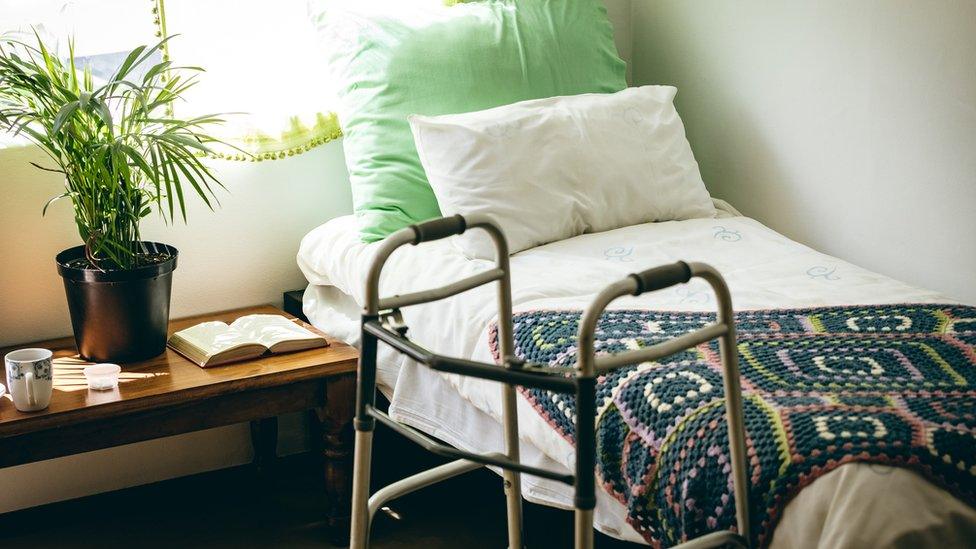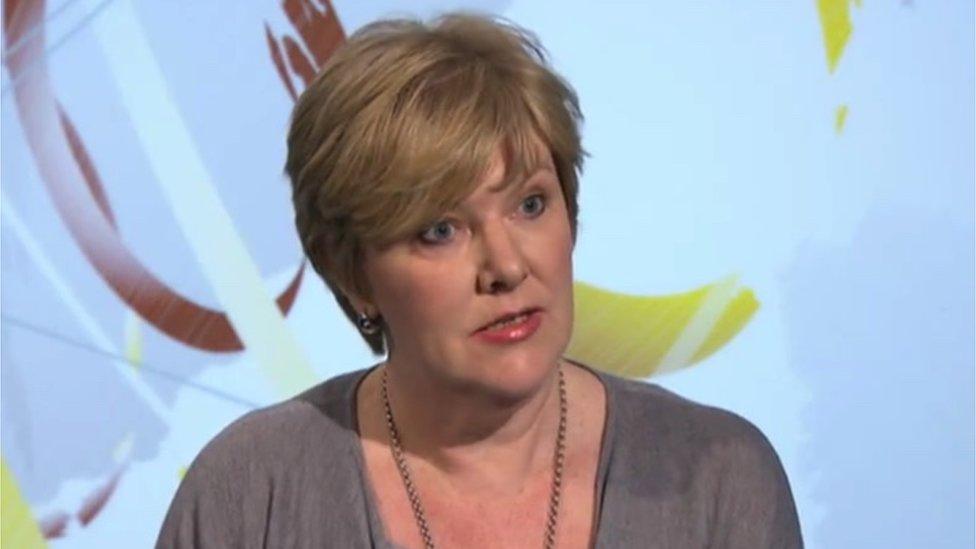Coronavirus: Staff needed to 'bolster' care homes, group warns
- Published
- comments

Nursing staff should be moved into care homes "as quickly as possible", a group representing the sector has warned.
Pauline Shepherd, of Independent Health and Care Providers, said more co-ordination was needed with health trusts to ease staffing pressures due to the Covid-19 pandemic.
On Monday, the health minister announced £6.5m funding for care homes.
It comes as 10 more deaths linked to Covid-19 were reported here, bringing the total to 309.
The figures cover mainly hospital deaths and are expected to rise once deaths in care homes and in the community are taken into account.
There have now been 3,374 confirmed positive cases.
About one third of virus-related deaths have been in care homes and hospices.
"Expert staff need to move with the virus in order to care for people," said Ms Shepherd.
"I'm concerned we are seeking volunteers and obviously to rely on volunteers - that takes some time to manage that process.
"I would like to think that we would be able to get staff transferred and moved into care homes as and when the need arises and to do that urgently," she added.
Extra funding
Care homes will receive payments of up to £20,000 from the fund announced by Robin Swann as part of a number of measures to support the sector during the pandemic.
He also confirmed expanded testing and updated infection prevention guidance for care homes, external.
The figures on deaths cover mainly those who have passed away in hospital and are expected to rise once deaths in care homes and in the community are taken into account.
Two sets of figures are published in Northern Ireland, a daily set produced by the Public Health Agency, which count mostly hospital deaths, and the weekly statistics from the Northern Ireland Statistics and Research Agency (Nisra), which cover all fatalities where coronavirus has been recorded on the death certificate.
Due to a time lag for registering deaths in the community, the Nisra figures, released on a Friday, only record deaths up until the previous week.

A SIMPLE GUIDE: How do I protect myself?
AVOIDING CONTACT: The rules on self-isolation and exercise
LOOK-UP TOOL: Check cases in your area
MAPS AND CHARTS: Visual guide to the outbreak

Under the minister's support package, homes will receive a payment of £10,000, £15,000 or £20,000 depending on their size.
The new guidance also sets out a new approach to managing hospital discharges.
It indicates that care homes should check residents and staff twice daily for coronavirus symptoms and highlights the need for "increased vigilance" due to potentially atypical symptoms in care home residents.
The guidance also indicates:
Testing will now be carried out on all staff and residents when a home is identified as having a potential outbreak or cluster of infections. The previous approach was to test staff and residents displaying symptoms
Patients being discharged from acute hospital care to a care home are to be tested 48 hours before discharge
Patients being transferred into a care home from any setting will be tested 48 hours prior to admission to help staff plan their care
All patients discharged from hospitals into care homes - whether they have tested negative or not - should be subject to isolation for 14 days

Pauline Shepherd said she welcomed Robin Swann's support on PPE, testing and staffing for care homes
Mr Swann described sufficient supplies of personal protective equipment (PPE) as "an absolute priority" and said Health and Social Care Trusts would work with care homes to ensure they had a buffer of stock.
He said he was taking steps "to ensure homes can continue to operate at this difficult time" and to help deal with staff shortages.
"I want to in particular encourage registered nurses who have transferable skills, expert knowledge and experience of caring for older people in a range of other settings to come forward and play their part in keeping vulnerable people out of hospital and in their own home," he said.
The minister also announced the piloting of a new model for care homes, which he said would "test an enhanced approach to care delivery and to help us learn lessons that we can roll out more widely".
"Building on initiatives already taking place in the sector, the approach will include supporting staff to live in the care home - helping to reduce the chances of coronavirus being carried into the home," he said.
"Our nursing and residential care homes are at the forefront of the battle against Covid-19. I want to pay tribute to the hard work and dedication of staff working across the care sector at this very challenging time."
Charity Age NI welcomed the announcement of extra funding, adding: "It is important, however, that measures are put in place to monitor and review this support to ensure it is adequate in the months ahead."
There are 484 care homes in Northern Ireland, with a total of 16,000 beds. Not all of those beds are occupied.
Across the UK, about 410,000 people live in care homes, many of which have had cases of Covid-19.